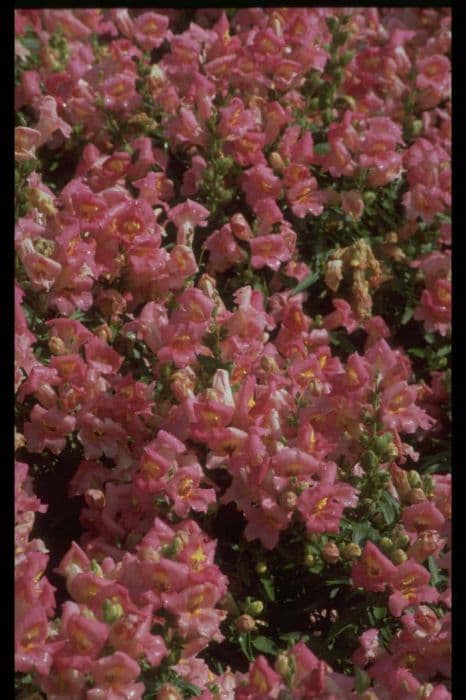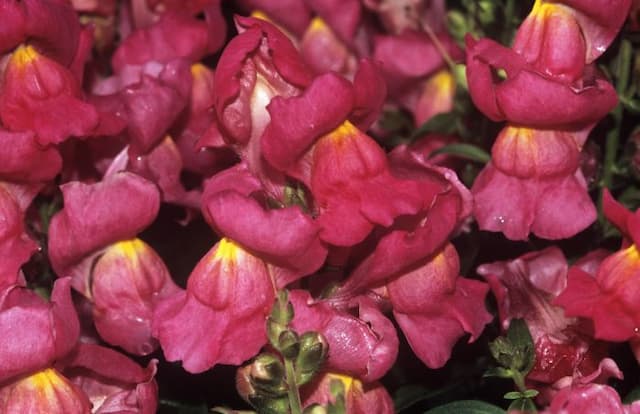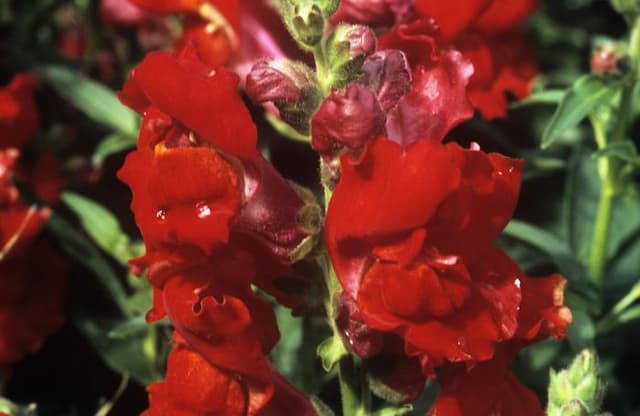Beardtongue Penstemon 'Evelyn'

ABOUT
Penstemon 'Evelyn' is a perennial plant known for its striking floral display and attractive foliage. It has a bushy, upright habit with glossy green leaves that are narrow and sometimes have a fine, serrated edge. The leaves grow densely along the stems, adding to the lush appearance of the plant. The most captivating feature of Penstemon 'Evelyn' are its flowers, which bloom in abundance. The tubular blossoms are arranged in panicles at the tips of the stems and are a delightful shade of pink, with a softer, almost pastel hue. Each flower is bell-shaped with a slightly flared mouth, displaying delicate veins and a gentle gradient in color intensity from the throat to the petal edges. The flowers are a favorite among pollinators such as bees and hummingbirds, drawn to the blooms for their nectar. The overall impression of Penstemon 'Evelyn' is that of a vibrant yet delicate plant, bringing a splash of soft color to the garden and harmonizing well with a variety of other perennials. The plant's ability to produce a profusion of flowers over a lengthy blooming period makes it a valuable addition to garden borders, rock gardens, or as an accent plant. Due to its cultivated nature, Penstemon 'Evelyn' is noted for its hardiness and resilience, able to withstand varying garden conditions with proper care. Its appearance, characterized by charming flowers and rich foliage, make it an excellent choice for gardeners looking to add long-lasting visual interest to their outdoor spaces.
About this plant
 Names
NamesFamily
Plantaginaceae
Synonyms
Beardtongue, Evelyn's Penstemon
Common names
Penstemon 'Evelyn'.
 Toxicity
ToxicityTo humans
Penstemon 'Evelyn', commonly known as Beardtongue, is not considered toxic to humans. There are no widespread reports of poisoning or adverse reactions from ingesting this plant. However, as with any plant, individual allergies or sensitivities could cause mild irritations, so it's advisable to avoid ingesting it.
To pets
Beardtongue is not known to be toxic to pets. There is no significant evidence to suggest that Penstemon 'Evelyn' would cause harm if ingested by animals such as dogs or cats. However, it is generally recommended to prevent pets from consuming plants to avoid any potential stomach upset or unforeseen allergic reactions.
 Characteristics
CharacteristicsLife cycle
Perennials
Foliage type
Deciduous
Color of leaves
Green
Flower color
Pink
Height
2-3 feet (60-90 cm)
Spread
1-2 feet (30-60 cm)
Plant type
Herb
Hardiness zones
4
Native area
North America
Benefits
 General Benefits
General Benefits- Attracts pollinators: Penstemon 'Evelyn' is known to attract bees and butterflies, which can help pollinate other plants in the garden.
- Drought-tolerant: Once established, it requires minimal watering, making it suitable for xeriscaping and water-wise gardens.
- Low maintenance: This plant typically needs little care beyond occasional pruning to maintain its shape and encourage new growth.
- Long blooming period: Penstemon 'Evelyn' offers a prolonged period of vibrant flowers, often from late spring to early fall.
- Visual appeal: With its tubular flowers in shades of pink or purple, it adds aesthetic value to garden beds, borders, and container plantings.
- Cold hardy: It can withstand cooler temperatures, making it a suitable perennial for many temperate climates.
- Deer resistant: The plant is not a preferred food source for deer, reducing the likelihood of damage in gardens prone to deer visits.
 Medical Properties
Medical PropertiesThis plant is not used for medical purposes.
 Air-purifying Qualities
Air-purifying QualitiesThis plant is not specifically known for air purifying qualities.
 Other Uses
Other Uses- Photography subject: The Penstemon 'Evelyn', with its elegant tubular flowers, makes for a beautiful photography subject for botanical photographers and garden enthusiasts looking to capture the intricate beauty of garden plants.
- Art inspiration: Artists may use the distinctive form and color of the Penstemon's blooms as inspiration for paintings, illustrations, or fabric designs.
- Educational tool: Botany teachers can use the Penstemon 'Evelyn' to educate students about plant reproductive structures and pollination, as the plant's flowers are known to attract bees and other pollinators.
- Garden design: Landscapers might use Penstemon 'Evelyn' for its vertical growing habit to create texture and height contrast in perennial garden beds or borders.
- Culinary decoration: Though not widely recognized for culinary uses, the blossoms can be used as an organic, colorful garnish for salads and desserts in high-end culinary presentations where edible flowers are appropriate.
- Eco-friendly confetti: The dried petals of Penstemon 'Evelyn' can be used as a natural, biodegradable confetti for outdoor celebrations, reducing the environmental impact of such events.
- Horticultural therapy: As a gardening activity, growing and tending to Penstemon 'Evelyn' can be incorporated into horticultural therapy programs to improve mental well-being and promote relaxation.
- Butterfly gardens: Penstemon 'Evelyn' can be included in butterfly garden designs to attract and provide nectar for butterflies, thereby supporting local biodiversity.
- Natural dye: The flowers of the Penstemon 'Evelyn' might be used to extract natural dyes for textile dyeing, offering an eco-friendly alternative to synthetic dyes.
- Craft projects: Dried Penstemon 'Evelyn' flowers can be used in crafting projects, such as making bookmarks, greeting cards, or floral arrangements.
Interesting Facts
 Feng Shui
Feng ShuiThe Penstemon is not used in Feng Shui practice.
 Zodiac Sign Compitability
Zodiac Sign CompitabilityThe Penstemon is not used in astrology practice.
 Plant Symbolism
Plant Symbolism- Endurance: Penstemon plants are known for their hardiness and ability to thrive in tough conditions, representing the ability to endure and persevere through challenges.
- Health: In herbal medicine, parts of the penstemon plant are considered beneficial for some ailments, therefore symbolizing good health and well-being.
- Attraction: With their bright and attractive flowers, penstemons can symbolize the allure and beauty that draws in positivity and interest.
- Diversity: Penstemons come in a variety of colors and forms, symbolizing diversity and the embracing of differences.
- Boldness: The vivid colors of the penstemon, such as those found in Penstemon 'Evelyn', can stand for boldness and the courage to stand out.
 Water
WaterBeardtongue, commonly known as Penstemon 'Evelyn', should be watered deeply to ensure the soil is moist but not waterlogged. It's best to water this plant when the top inch of soil feels dry to the touch, which typically means providing water about once a week. During hot, dry periods, you may need to water more frequently, while in cooler or rainy conditions, less frequent watering is required. An approximate amount of one gallon of water per plant each time you water should suffice. Over-watering can lead to root rot, so it's crucial to allow the soil to dry slightly between waterings.
 Light
LightBeardtongue thrives in full sun, receiving at least six hours of direct sunlight daily. However, it can tolerate some light shade, especially in areas with intense afternoon sun. The ideal spot for a Penstemon 'Evelyn' is a location where it can soak up the morning sun, which is less harsh than the afternoon rays. Adequate light ensures the best growth and flowering.
 Temperature
TemperatureBeardtongue is hardy and can tolerate a wide range of temperatures, but it grows best in temperatures between 60°F and 75°F. It can generally handle temperatures down to about 20°F and up to around 85°F. To promote optimal growth, avoid placing this plant in areas that experience extreme temperatures or frequent temperature fluctuations.
 Pruning
PruningPruning Beardtongue encourages a tidier plant and can help promote more robust blooming. After flowering, trim back the spent flower spikes to encourage a second bloom in the fall. Additionally, lightly prune the plant in early spring to shape it and remove any dead or damaged stems. The best time for substantial pruning is after the last frost when the plant shows new growth.
 Cleaning
CleaningAs needed
 Soil
SoilBeardtongue 'Evelyn' thrives in well-draining soil with a pH ranging from slightly acidic to neutral. A mix of garden soil, compost, and coarse sand or perlite encourages healthy growth. Ensure the soil has good aeration and amend with organic matter to retain moderate moisture while avoiding waterlogging.
 Repotting
RepottingBeardtongue 'Evelyn' typically requires repotting every 2-3 years. It's best to repot in the spring as new growth appears, which gives the plant time to establish in fresh soil before the growing season.
 Humidity & Misting
Humidity & MistingBeardtongue 'Evelyn' prefers average humidity levels and is tolerant of the dry conditions often found in typical home environments. No special humidity adjustments are necessary for this plant’s health.
 Suitable locations
Suitable locationsIndoor
Place in bright light, well-draining soil, water when dry.
Outdoor
Plant in full sun, well-drained soil, water moderately.
Hardiness zone
4-9 USDA
 Life cycle
Life cyclePenstemon 'Evelyn', commonly known as Beardtongue, begins its life cycle as a seed that, once sown in well-draining soil and exposed to warm conditions, will germinate. Seedlings emerge and establish a root system, after which the plant enters a vegetative state characterized by the growth of leaves and stems. As it matures, Evelyn Beardtongue develops flower buds in late spring or early summer, which bloom into tubular flowers that attract pollinators like bees and hummingbirds. After pollination, flowers develop into fruit capsules containing numerous small seeds. Once ripe, these seed capsules split, dispersing the seeds to begin a new generation, while the parent plant may enter a period of dormancy, especially in regions with cold winters. The plant will resume growth in the following spring, repeating this annual or perennial cycle depending on regional climatic conditions.
 Propogation
PropogationPropogation time
Spring-Early Summer
Propogation: The most popular method for propagating Penstemon, including the 'Evelyn' variety, is through stem cuttings, particularly in early to mid-summer when the plant is actively growing. To propagate by cuttings, take a healthy stem of about 4-6 inches long, ensuring there are several leaf nodes present. Strip the leaves from the lower half of the cutting and dip the cut end into rooting hormone powder to encourage root growth. Then, insert the cutting into a pot filled with a moistened mixture of peat and perlite. Cover the pot with a plastic bag to create a humid environment, and place it in a warm spot with indirect sunlight. Rooting typically takes 3-4 weeks, after which the new Penstemon 'Evelyn' can be transplanted into the garden.









